Haozhen Li
A CSI Feedback Framework based on Transmitting the Important Values and Generating the Others
Nov 20, 2024Abstract:The application of deep learning (DL)-based channel state information (CSI) feedback frameworks in massive multiple-input multiple-output (MIMO) systems has significantly improved reconstruction accuracy. However, the limited generalization of widely adopted autoencoder-based networks for CSI feedback challenges consistent performance under dynamic wireless channel conditions and varying communication overhead constraints. To enhance the robustness of DL-based CSI feedback across diverse channel scenarios, we propose a novel framework, ITUG, where the user equipment (UE) transmits only a selected portion of critical values in the CSI matrix, while a generative model deployed at the BS reconstructs the remaining values. Specifically, we introduce a scoring algorithm to identify important values based on amplitude and contrast, an encoding algorithm to convert these values into a bit stream for transmission using adaptive bit length and a modified Huffman codebook, and a Transformer-based generative network named TPMVNet to recover the untransmitted values based on the received important values. Experimental results demonstrate that the ITUG framework, equipped with a single TPMVNet, achieves superior reconstruction performance compared to several high-performance autoencoder models across various channel conditions.
Dig-CSI: A Distributed and Generative Model Assisted CSI Feedback Training Framework
Dec 10, 2023


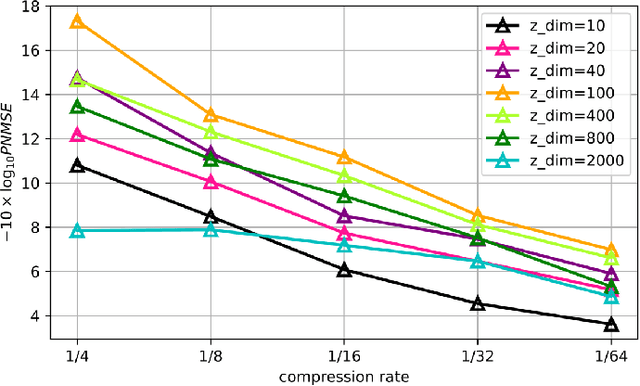
Abstract:The advent of deep learning (DL)-based models has significantly advanced Channel State Information (CSI) feedback mechanisms in wireless communication systems. However, traditional approaches often suffer from high communication overhead and potential privacy risks due to the centralized nature of CSI data processing. To address these challenges, we design a CSI feedback training framework called Dig-CSI, in which the dataset for training the CSI feedback model is produced by the distributed generators uploaded by each user equipment (UE), but not through local data upload. Each UE trains an autoencoder, where the decoder is considered as the distributed generator, with local data to gain reconstruction accuracy and the ability to generate. Experimental results show that Dig-CSI can train a global CSI feedback model with comparable performance to the model trained with classical centralized learning with a much lighter communication overhead.
HybridCVLNet: A Hybrid CSI Feedback System and its Domain Adaptation
Mar 30, 2023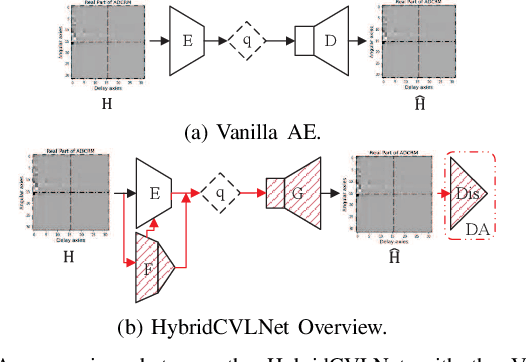
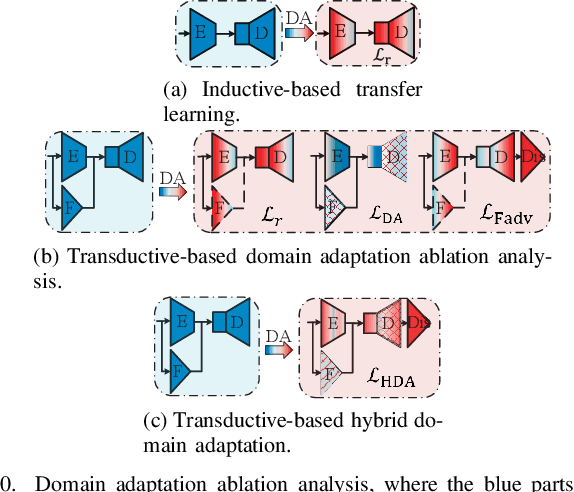
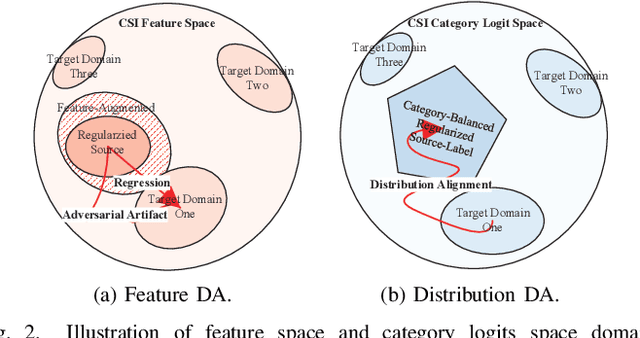
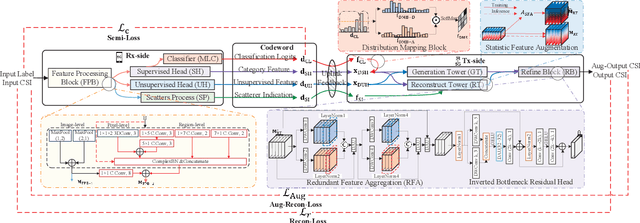
Abstract:Deep Learning (DL)-based channel state information (CSI) feedback is a promising technique for the transmitter to accurately acquire the CSI of massive multiple-input multiple-output (MIMO) systems. As a critical concern about DL-based physical layer application, although most existing CSI feedback methods have shown advantages in dedicated channel environments and scenarios, the generalization and adaptivity of these methods remain challenging. Therefore, we propose a Hybrid Complex-Valued Lightweight framework, namely HybridCVLNet, with a hybrid structure, task, and codeword and correspondent domain adaptation scheme to overcome the data drift and dataset bias for CSI feedback. The experiment verifies the validity of the proposed lightweight HybridCVLNet regularization to the regression process. It achieves stable generalizability and performance gain over the SOTA feedback schemes in an intra-domain multi-category setting. In addition, its hybrid domain adaptation scheme is more efficient and superior to the online direct-finetune method under the unseen cross-domain dataset.
Multi-task Deep Neural Networks for Massive MIMO CSI Feedback
Apr 18, 2022
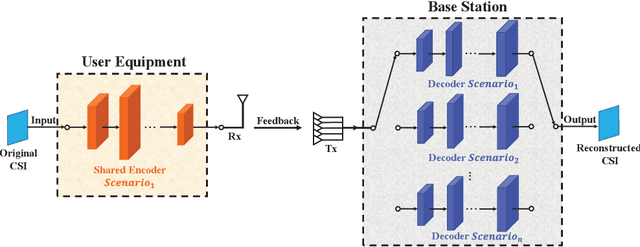
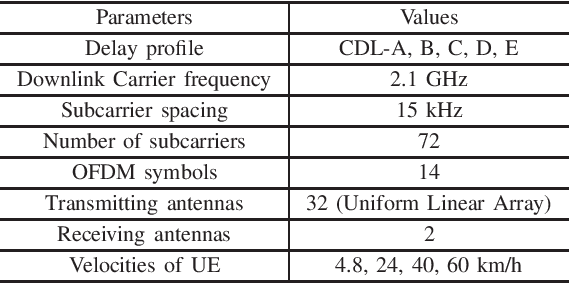
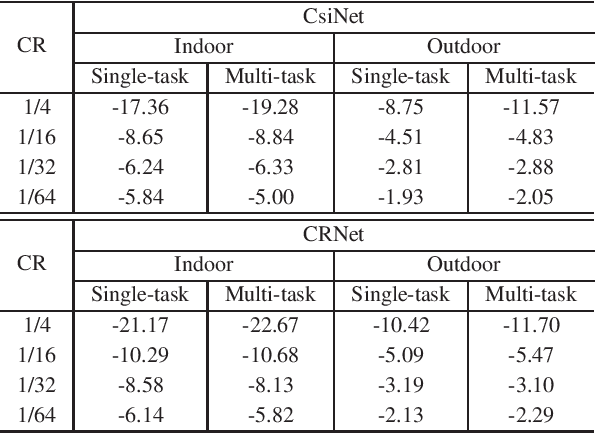
Abstract:Deep learning has been widely applied for the channel state information (CSI) feedback in frequency division duplexing (FDD) massive multiple-input multiple-output (MIMO) system. For the typical supervised training of the feedback model, the requirements of large amounts of task-specific labeled data can hardly be satisfied, and the huge training costs and storage usage of the model in multiple scenarios are hindrance for model application. In this letter, a multi-task learning-based approach is proposed to improve the feasibility of the feedback network. An encoder-shared feedback architecture and the corresponding training scheme are further proposed to facilitate the implementation of the multi-task learning approach. The experimental results indicate that the proposed multi-task learning approach can achieve comprehensive feedback performance with considerable reduction of training cost and storage usage of the feedback model.
Changeable Rate and Novel Quantization for CSI Feedback Based on Deep Learning
Feb 28, 2022
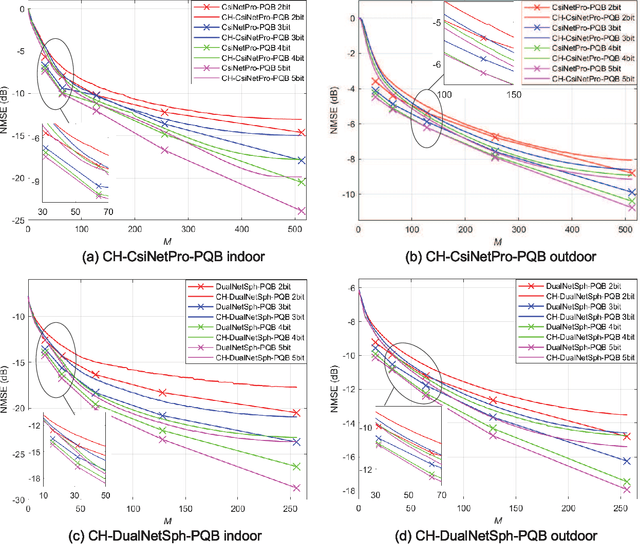


Abstract:Deep learning (DL)-based channel state information (CSI) feedback improves the capacity and energy efficiency of massive multiple-input multiple-output (MIMO) systems in frequency division duplexing mode. However, multiple neural networks with different lengths of feedback overhead are required by time-varying bandwidth resources. The storage space required at the user equipment (UE) and the base station (BS) for these models increases linearly with the number of models. In this paper, we propose a DL-based changeable-rate framework with novel quantization scheme to improve the efficiency and feasibility of CSI feedback systems. This framework can reutilize all the network layers to achieve overhead-changeable CSI feedback to optimize the storage efficiency at the UE and the BS sides. Designed quantizer in this framework can avoid the normalization and gradient problems faced by traditional quantization schemes. Specifically, we propose two DL-based changeable-rate CSI feedback networks CH-CsiNetPro and CH-DualNetSph by introducing a feedback overhead control unit. Then, a pluggable quantization block (PQB) is developed to further improve the encoding efficiency of CSI feedback in an end-to-end way. Compared with existing CSI feedback methods, the proposed framework saves the storage space by about 50% with changeable-rate scheme and improves the encoding efficiency with the quantization module.
CSI Sensing and Feedback: A Semi-Supervised Learning Approach
Sep 26, 2021
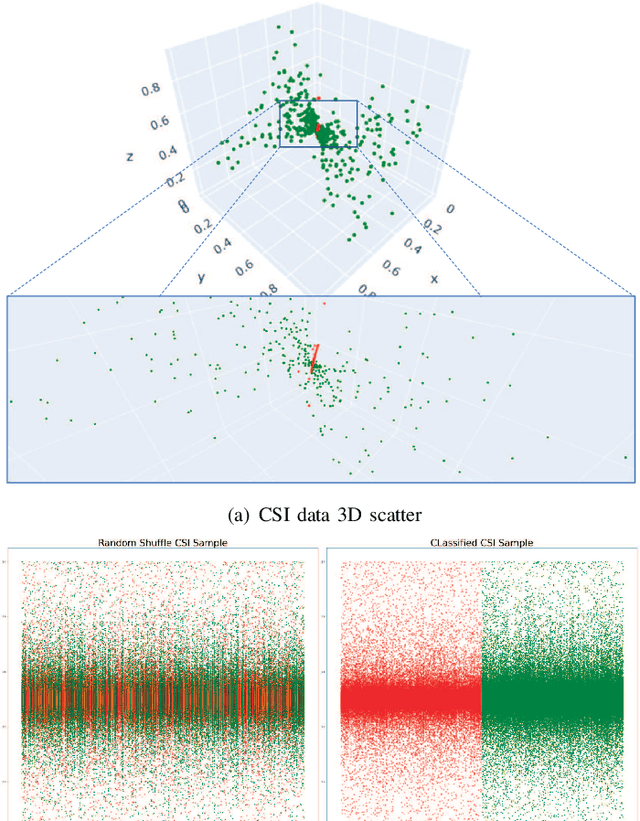
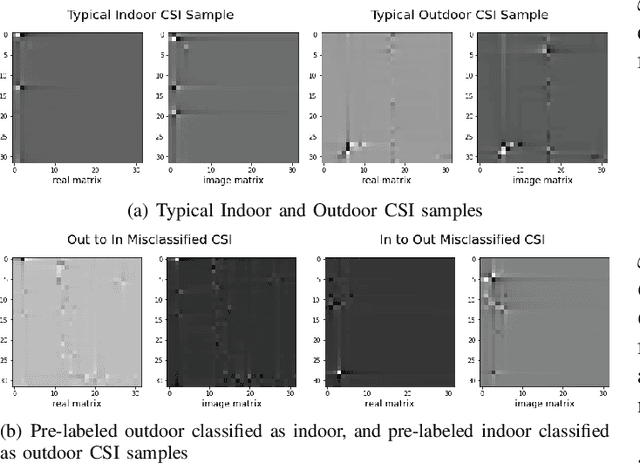

Abstract:Deep learning-based (DL-based) channel state information (CSI) feedback for a Massive multiple-input multiple-output (MIMO) system has proved to be a creative and efficient application. However, the existing systems ignored the wireless channel environment variation sensing, e.g., indoor and outdoor scenarios. Moreover, systems training requires excess pre-labeled CSI data, which is often unavailable. In this letter, to address these issues, we first exploit the rationality of introducing semi-supervised learning on CSI feedback, then one semi-supervised CSI sensing and feedback Network ($S^2$CsiNet) with three classifiers comparisons is proposed. Experiment shows that $S^2$CsiNet primarily improves the feasibility of the DL-based CSI feedback system by \textbf{\textit{indoor}} and \textbf{\textit{outdoor}} environment sensing and at most 96.2\% labeled dataset decreasing and secondarily boost the system performance by data distillation and latent information mining.
 Add to Chrome
Add to Chrome Add to Firefox
Add to Firefox Add to Edge
Add to Edge